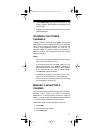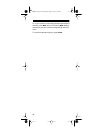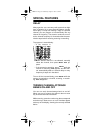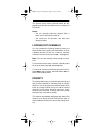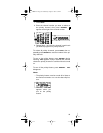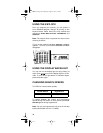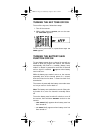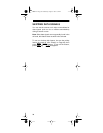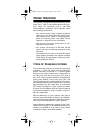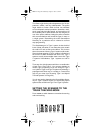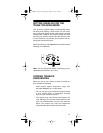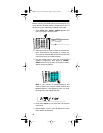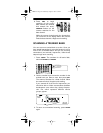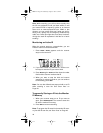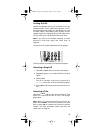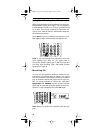
39
TRUNK TRACKING
Your scanner is designed to track transmissions on Mo-
torola Type I, Type II, and hybrid analog trunking sys-
tems, which are extensively used in 800 MHz
communications. Remember these important points
when tracking transmissions:
• Your scanner monitors Type II systems by default.
However, you can change this if the system in your
area is different (see “Types of Trunking Systems”
below and “Scanning Type I and Hybrid Trunked
Systems” on Page 50 for more information).
• Your scanner cannot track transmissions on non-
Motorola trunking systems.
• Your scanner cannot track an 800 MHz trunked
system and scan conventional frequencies at the
same time.
• The frequencies for many of the 800 MHz public
safety systems are listed in the separate “National
Public Safety Trunked System Frequency Guide”
included with your PRO-91.
TYPES OF TRUNKING SYSTEMS
Your trunk tracking scanner can monitor two basic types
of systems —
Type I
and
Type II
. Instead of selecting a
specific frequency to transmit on, a trunked system
chooses one of several frequencies in a 2-way radio us-
er’s talk group when that user presses PTT (push to
talk). Thus, trunking systems allocate a few frequencies
among many different users, but the way Type I and
Type II systems do this is slightly different. One impor-
tant distinction between these systems is the amount of
data transmitted by each radio when its push-to-talk
(PTT) button is pressed. In a Type I system, the radio’s
ID and its current affiliation (the trunk system it belongs
to) are both transmitted. In a Type II system, only the ra-
dio’s ID is transmitted.
Why the difference? In Type I systems, each radio in
the trunk group individually transmits its own affiliation,
while the trunk system maintains a database that deter-
mines each radio's affiliation(s) in Type II systems.
Another difference between the systems is that Type I
systems are arranged in a fleet-subfleet hierarchy. For
example, it is possible for a city using a Type I system
to designate 4 fleets, each with 8 subfleets.
20-521.fm Page 39 Wednesday, August 4, 1999 3:32 PM



